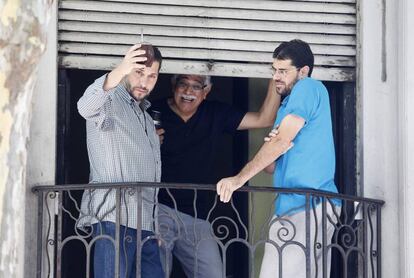Six ex-Guantanamo detainees struggle to make a life in Uruguay
The disappearance of a former prisoner in the country reveals how complicated life can be for refugees outside the detention center

Jihad Ahmed Mujstafa Diyab, a former Guantanamo detainee who was released and resettled in Uruguay in December 2014, has disappeared in Brazil just a month before the country is due to host the Olympic Games. Meanwhile, five other ex-prisoners who were also resettled in Uruguay two years ago are grappling with unemployment and social exclusion. Two of them have been accused of domestic violence and only one former inmate has found work.
Diyab, a 44-year-old Syrian citizen, has not been to his home in Montevideo for two weeks. He was spotted during Ramadan in Chuy, a “Little Palestine” on the border with Brazil and the only place in Uruguay that has a mosque. An airline company published a photograph of Diyab in Brazil to warn authorities that he was in the country illegally and was probably using a fake passport. Uruguayan authorities admit that he may have crossed the border.
Two of the former prisoners have been accused of domestic violence and only one former inmate has found work
Diyab is officially a free man with Uruguayan papers, and Uruguay has always denied any secret agreement with the United States to prevent former detainees from leaving the country. Yet the American chargé d’affaires in Montevideo said the former prisoner was being watched and the United States and Uruguay are joining efforts to locate him.
Assimilation is complicated for ex-Guantanamo prisoners and Diyab’s case is more delicate than most. Uruguay, a country of immigrants that was founded when six families arrived on its shores in the 18th century, is following the refugees’ plight closely. Their names and photographs appear in the news. Though most people have shown them support, they are also judged harshly.
The ex-inmates are all studying the Spanish language and a trade as they struggle to assimilate in the workplace and in society. A former detainee of Tunisian origin was arrested for domestic violence in February and had to wear an electronic ankle monitor. He is also the only one of the ex-Guantanamo prisoners who settled in Uruguay to have found employment. He works in an Islamic center. Another former detainee from Syria has also had to wear an ankle tag, after claims of domestic abuse against his Uruguayan wife, who has converted to Islam.
Sign up for our newsletter
EL PAÍS English Edition has launched a weekly newsletter. Sign up today to receive a selection of our best stories in your inbox every Saturday morning. For full details about how to subscribe, click here.
One ex-inmate just had a daughter but he is unemployed. Uruguayan authorities provide lodging and a monthly allowance of $500 to every refugee but the basic cost of living is about three times that amount.
After 12 years in Guantanamo without being formally accused or given the opportunity to stand trial, Diyab’s health was worse than that of the others when he arrived in Uruguay. He held several hunger strikes while in Guantanamo and was force-fed via a nasogastric tube. He suffers from kidney, back and heart problems and has to use crutches to move.
As soon as Diyab arrived in Uruguay, he found out that one of his four children had died in Syria. The rest of his family has not been able to come see him. His relatives blame the ineffectiveness of Uruguayan authorities for the delays.
As the former prisoner became increasingly irritated and unhappy with life in Uruguay, he began to tell detainees who were still in Guantanamo to remain inside instead of accepting a transfer to the South American country. He also publicly acknowledged his sympathies for Al Qaeda.
As soon as Diyab arrived in Uruguay, he found out that one of his four children had died in Syria
But Diyab also received a great deal of support from social service workers, human rights activists, doctors, nurses and journalists. They all tell the same story: as a result of his time at the detention center, there was always a significant difference between temperatures on left and right sides of his body. He always asked men – never a woman – to touch his arms. And they all remember that one felt cold while the other ran hot.
As Uruguay faces its worst winter in decades, Diyab was living in a home without heat or hot water. Many say his disappearance was to be expected.
English version by Dyane Jean François.
Tu suscripción se está usando en otro dispositivo
¿Quieres añadir otro usuario a tu suscripción?
Si continúas leyendo en este dispositivo, no se podrá leer en el otro.
FlechaTu suscripción se está usando en otro dispositivo y solo puedes acceder a EL PAÍS desde un dispositivo a la vez.
Si quieres compartir tu cuenta, cambia tu suscripción a la modalidad Premium, así podrás añadir otro usuario. Cada uno accederá con su propia cuenta de email, lo que os permitirá personalizar vuestra experiencia en EL PAÍS.
¿Tienes una suscripción de empresa? Accede aquí para contratar más cuentas.
En el caso de no saber quién está usando tu cuenta, te recomendamos cambiar tu contraseña aquí.
Si decides continuar compartiendo tu cuenta, este mensaje se mostrará en tu dispositivo y en el de la otra persona que está usando tu cuenta de forma indefinida, afectando a tu experiencia de lectura. Puedes consultar aquí los términos y condiciones de la suscripción digital.








































